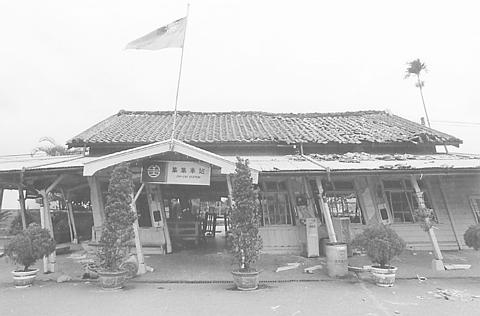The massive 921 earthquake not only claimed the lives of thou-sands of Taiwanese and their homes -- it left dozens of Taiwan's historic sites in ruins.
While an overall inspection of Taiwan's 388 national historic sites is being undertaken by the Ministry of Interior (MOI), some of the sites may unfortunately be gone forever because they were so severely damaged, according to the MOI's Civil Affairs director Chi Chun-chen (紀俊臣).
Among the damaged sites, the 200-year old Lin Family Gardens in Wufeng (

PHOTO: LU CHUN-WEI, LIBERTY TIMES
"Ninety percent of the wooden buildings were destroyed," Chi said, after checking the site with experts.
Ironically, according to Lin Cheng-chi (
The Lin family complex was owned by the wealthiest family in central Taiwan.
The complex, which covered 3,888 square meters, preserved many fine examples of Chinese-style architecture of the Ching dynasty. But the quake two weeks ago demolished nearly the whole area and claimed the lives of two members of the Lin clan.
"All that can be done now is to preserve the wooden relics and antiques left in the debris," Chi said. "We are still considering if we will rebuild the site or abolish it."
According to an initial estimate by the interior ministry, it could take more than NT$100 million to rebuild the complex.
Like the Lin mansion, the Lungshan Temple (龍山寺) in Lukan (鹿港), Chanhua County, was seriously damaged and will require NT$20 million to repair.
In Nantou County, three classical academies -- Mingshin (明新), Tengyen (登簷) and Lantien (藍田) -- were partly collapsed and will also require several millions of dollars for reconstruction, said Chi.
So far, the government has budgeted NT$250 million for emergency repair of damaged historic sites.
However, according to architect Yang Ren-chiang (
At the same time, both legislators and cultural heritage preservation groups urged the government take a closer look at other unregistered historical buildings.
DPP lawmaker Fan Shun-lu (
"As buildings with indicative red tape on them will be demolished within a week under the government's emergency decree, we are worried that those marked historic buildings will also be demolished," said Fan.
Among those buildings, the Chichi Railway Station (集集火車站) -- once a famous tourist spot -- was one of those dangerous buildings, according to Chiu Ru-hua (丘如華) of the Yaoshan Foundation (樂山文教基金會).
In response, Lin Cheng-chi has vowed to save the Chichi station from the wrecking ball.
"We will rebuild the station, and make it a symbol [of inspiration] to help the quake-stricken town stand up again," Lin said.
The Yaoshan Foundation has organized architectural scholars and students to form the League for 921 Reconstruction of Cultural Heritage.
So far, hundreds of professionals have gone to disaster sites for volunteer inspections.

ACTION PLAN: Taiwan would expand procurement from the US and encourage more companies to invest in the US to deepen bilateral cooperation, Lai said The government would not impose reciprocal tariffs in retaliation against US levies, President William Lai (賴清德) said yesterday, as he announced five strategies to address the issue, including pledging to increase Taiwanese companies’ investments in the US. Lai has in the past few days met with administrative and national security officials, as well as representatives from various industries, to explore countermeasures after US President Donald Trump on Wednesday last week announced a 32 percent duty on Taiwanese imports. In a video released yesterday evening, Lai said that Taiwan would not retaliate against the US with higher tariffs and Taiwanese companies’ commitments to

‘SPECIAL CHANNEL’: Taipei’s most important tasks are to stabilize industries affected by Trump’s trade tariffs and keep negotiations with Washington open, a source said National Security Council Secretary-General Joseph Wu (吳釗燮) arrived in the US for talks with US President Donald Trump’s administration, a source familiar with the matter said on Friday. Wu was leading a delegation for a meeting known as the “special channel,” the Financial Times reported earlier. It marked Trump’s first use of the channel since returning to the White House on Jan. 20. Citing a source familiar with the matter, the Financial Times reported that Minister of Foreign Affairs Lin Chia-lung (林佳龍) was also a part of the delegation. The visit came days after China concluded war games around Taiwan and amid Trump’s

CHIP EXCEPTION: An official said that an exception for Taiwanese semiconductors would have a limited effect, as most are packaged in third nations before being sold The Executive Yuan yesterday decried US President Donald Trump’s 32 percent tariff on Taiwanese goods announced hours earlier as “unfair,” saying it would lodge a representation with Washington. The Cabinet in a statement described the pledged US tariffs, expected to take effect on Wednesday next week, as “deeply unreasonable” and “highly regrettable.” Cabinet spokeswoman Michelle Lee (李慧芝) said that the government would “lodge a solemn representation” with the US Trade Representative and continue negotiating with Washington to “ensure the interests of our nation and industries.” Trump at a news conference in Washington on Wednesday announced a 10 percent baseline tariff on most goods

Intelligence agents have recorded 510,000 instances of “controversial information” being spread online by the Chinese Communist Party (CCP) so far this year, the National Security Bureau (NSB) said in a report yesterday, as it warned of artificial intelligence (AI) being employed to generate destabilizing misinformation. The bureau submitted a written report to the Legislative Yuan in preparation for National Security Bureau Director-General Tsai Ming-yen’s (蔡明彥) appearance before the Foreign Affairs and National Defense Committee today. The CCP has been using cognitive warfare to divide Taiwanese society by commenting on controversial issues such as Taiwan Semiconductor Manufacturing Co’s (TSMC, 台積電) investments in the